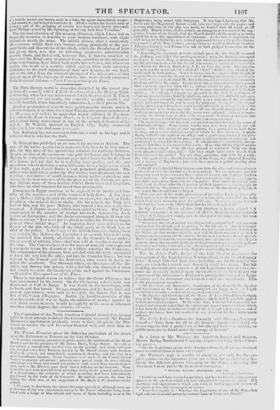M. Blanqui has publishel an account of his mission to
Algiers. The saint of the native population is represented by him to be very miser- able, but that most of the speculating colonists are realizing, fortunes. To give an idea of the enormous runis paid for heuses and lo:Igings in Algiers, he states that a restaurateur pays e,itoo franes fur the first flour of a house, nml yet that he is realizing large profits; and that one se...oaf:nor, who is deriving a splendid income from a large house -whieh 1: has built, pays 15,000 francs a year perpetual ground-rent. The natives who held ollices under the Dey having been dismissed, are DOW sterving : and natives of small incomes, being unable to purchase pro- visious at the dear rate calmed by the presence of the Feench, are quit- ting klgiers, many of them leaving bellied them wives and daughters, who have no other resource for bread than prostitution.
Europeans in Egypt continue to he exposed to the insults and bru- tality of the populace, and of the seamen of both Lots. A few davs too. a Mnbese riding through the streets on an ass, was Ina le: a Turk- officer, who ordered hint to alight. Out his refusal, the Turk la:1 lolI of him, and the poor Maltese, who wanted a leg., was cosily dis- t.: etnted. A dispute ensued, which soon ended in blows. The Turks o•eeregated to the number of several hundreds, denonneing death o till Europeans ; and the Arabs encouraged them to ill-treat tile 7.h:A saying, " Yon need not he afraid to strike, the Pasha et> longer -s those infidel dogs." An imposing force soots arrived on the theatre of the riot, who took oft' the whole party to .lie Bach Aga, Or
chief of the police. A Jaiti:s.try Behish Cousa'ete hovin,:; ben
• .•1 claim' the Maltese, the .'isa refused to commit him to his care, ... marched' him shortly afterwards to the Constire house under a sto escort of soldiers, whose chief was told to rootire a receipt for the s line. The Consul objected to the' unusual dem:. 'id, and expressed in eaurgetie tirms his discontent at soldiers entering the Consolate. The commander of the platoon, little satisfied with this reply, attempted to foeee his way into the office, and into the Consular house ; but was resisted by the Consul and the Janissaries, who, sword in hand, re- pelled the assailants. The Ottoman officer, the first cause of the dis- order, was thrown into prison, with a dervish, who mounted a stow: and sought to excite the fanaticism of the mob against the Christians. --A/exandeia Cor,v,5pumience qf Me Times.
There is too much reason to believe that the Count d'Espagne has been assassinated by his escort. Oa the ith instant, a dead body was discovered at Coll de Nargo. It was found in the river Segre, with its hands and feet bound. Its ago, corpulence, and its hoary hoir, and geneeal appearances, were such as to satisfy the tinders that it was that of the Count d'Eopagne. Amidst the horrible atrocities of this most detestable civil war ia Spain, the addition of anotherr murder in cold blood seems scarcely to add perceptibly to the mass of inhuman atrocities which disgrace that country.—Couricr.


























 Previous page
Previous page